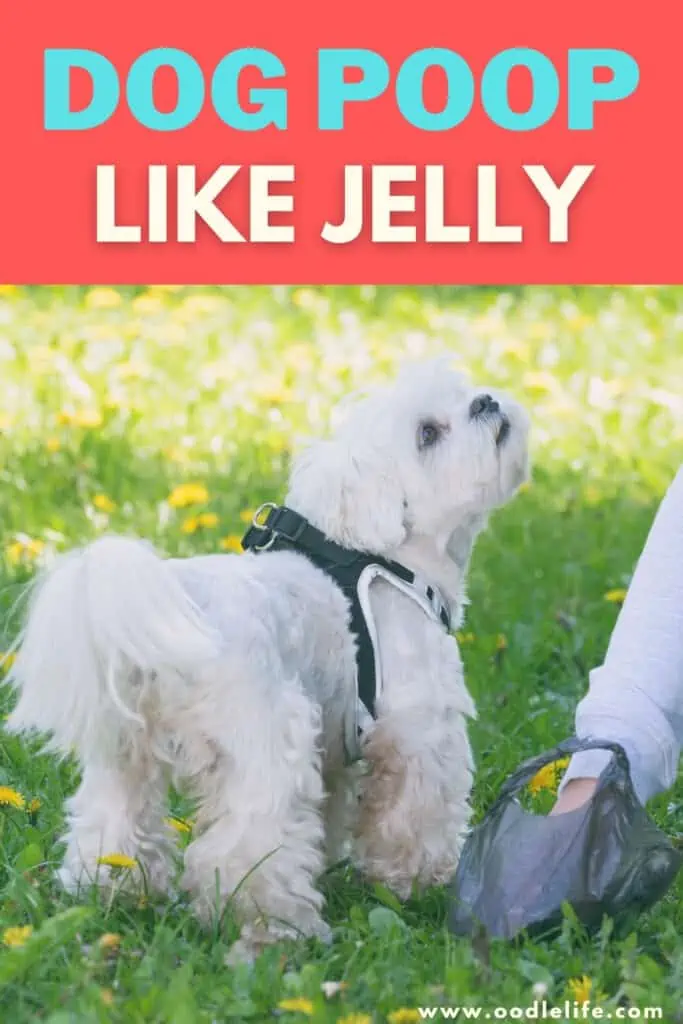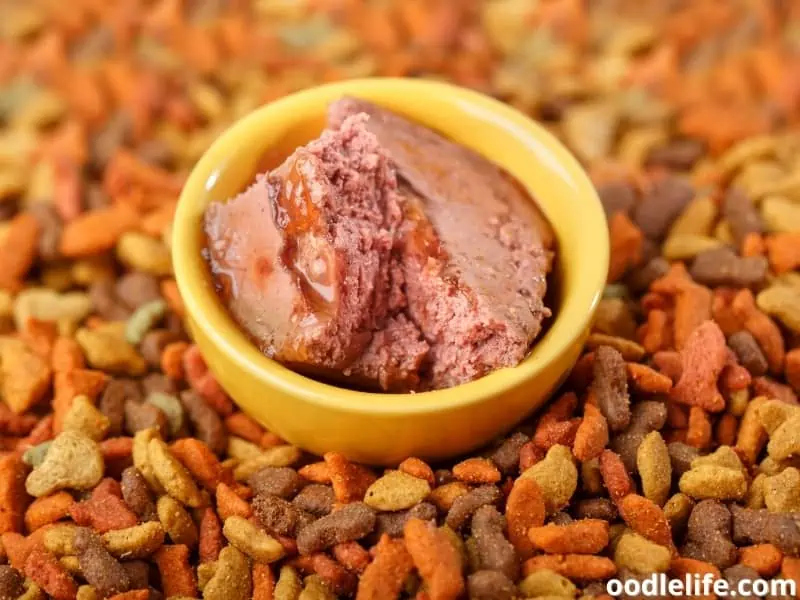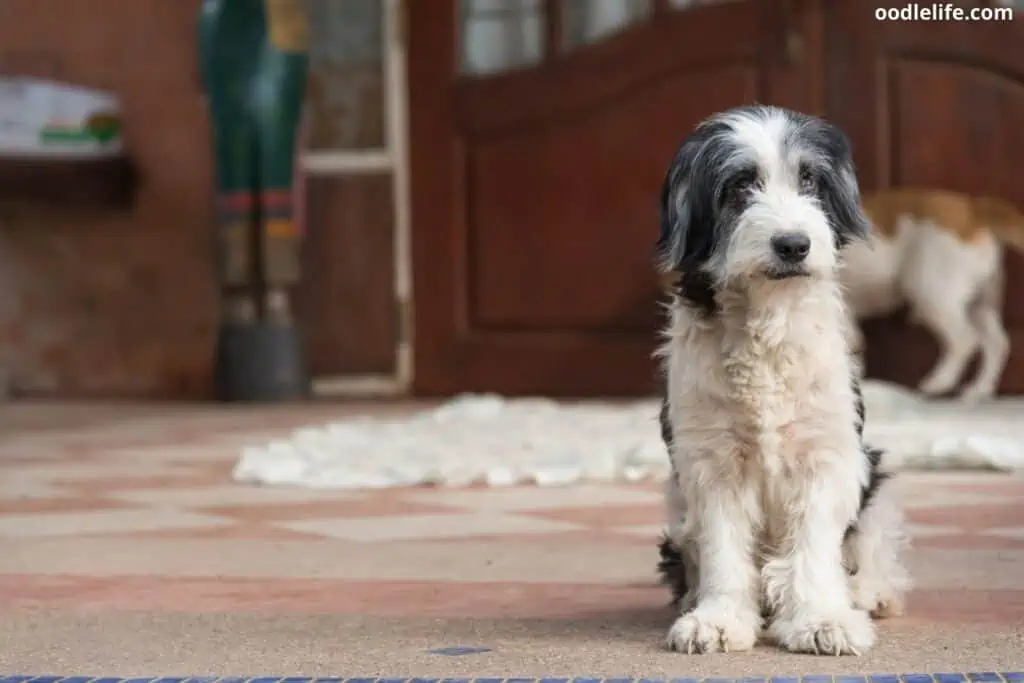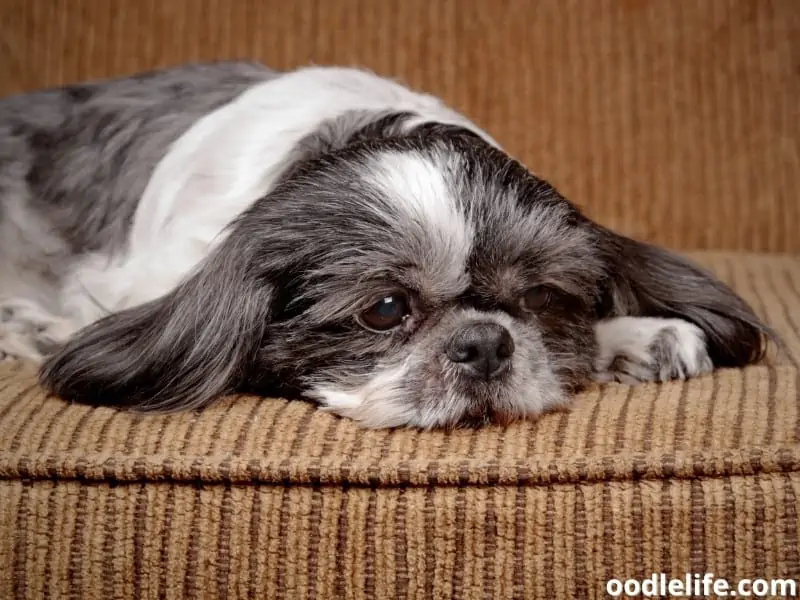Dog Poop Like Jelly—What Does It Mean?
Whether or not they want to, most dog owners have a close relationship with their dog’s poop, given that they pick it up when on a walk in the neighborhood or the backyard.
So, if your dog’s poop is the same consistency as jelly, you understandably want to know what it means.

Let’s get this out of the way: Your dog probably didn’t get into the jelly sitting on your kitchen counter. Instead, there are several harmless and potentially life-threatening reasons that your dog’s poop is like jelly.
Understanding the Digestive Tract
All dogs produce a jelly-like slime in their lower intestinal glands. The purpose of this mucus is to allow your dog to poop more easily, given that the colon has lubrication.
It sounds gross, but a dog’s mucus often comes from dead skin cells that their body repurposes to prevent straining and constipation.
So, it’s natural for some of that slime to rub off from the colon and into your dog’s stool. Furthermore, globs of mucus sometimes accumulate at the end of the poop. If you happen to poke around at your dog’s poop, you might notice some mucus inside it, too.
Such slime around or inside your dog’s poop once in a while isn’t a reason to worry. However, if slime becomes a regular occurrence, it might be time to take a trip to the vet.

Signs of Abnormal Mucus in Dog Poop
If you notice any of the following in your dog’s poop mucus, it’s a sign that they may have a health problem.
- Bloody mucus
- Discoloration in the mucus (health mucus is usually clear or white)
- Excessive amounts of mucus
Causes of Abnormal Mucus in Your Dog’s Poop
Below are some common causes of unusual mucus build-up in dog poop. By the time you read through this, you’ll be able to confidently answer the question, “Dog poop like jelly—what does it mean?” if someone asks you.
1. Irritable Bowel Disease
Just like humans, dogs can suffer from irritable bowel disease (IBD). The condition results from an inflamed or irritated large intestine or colon. Many factors can cause IBD in dogs, including:
- Change in diet
- Stress
- Infection
The good news is that IBD isn’t a life-threatening condition. However, it can be extremely uncomfortable for your dog and even cause them a lot of pain.
Depending on the severity of the IBD your dog is experiencing, jelly in their poop might not be the only symptom. Other signs of IBD include vomiting, lethargy, weight loss, and diarrhea.
If you guessed that their diarrhea comes with lots of jelly-like mucus, you’re spot-on.
Should you believe that IBD is causing your dog’s strange poop, take them to the veterinarian. Your vet will confirm this condition and help you figure out what’s causing it. In most cases, changing your dog’s diet will resolve the problem, and sometimes it’ll take putting your dog on hypoallergenic dog food.

2. Hemorrhagic Gastroenteritis
Hemorrhagic gastroenteritis (HGE) is a potentially life-threatening issue that causes bloody diarrhea, often accompanied by excessive amounts of mucus. In this case, the blood will appear like thick globs because of the jelly-like substance.
Although HGE can impact any dog, small dogs have a higher chance of getting it. The Maltese, Miniature Poodle, and Yorkshire Terrier are among them.
Scientists don’t yet know what causes most HGE cases in dogs. However, the symptoms include:
- Vomiting
- Bright red blood in diarrhea
- Pain in the abdomen
- Fatigue
Taking your dog to the vet quickly if you suspect they have HGE is crucial for a full recovery. By doing so, your dog may recover within a few weeks.
3. Anxiety
If your dog suffers from separation anxiety or other nervous behaviors, they may have mucus in their poop. That’s especially the case if their anxiousness causes diarrhea.
Should your dog have jelly-like poop from stress and anxiety, a vet can do little to help other than potentially prescribe calming medication.
Instead, it’s best to work with a trainer to help your dog overcome their anxious ways. A pet therapist can also help, especially if you adopted a dog and sense their nervousness stems from past trauma.

4. Eating Something Toxic
Toxins disrupt the gastrointestinal tract, so a common symptom of a dog eating something toxic is for their body to produce excess mucus, which exits via their poop.
Other signs of a dog consuming something poisonous include frequent diarrhea and vomiting, an unsteady gait, and seizures.
Many common foods humans consume are unfortunately toxic to dogs. They include:
- Grapes and raisins
- Chocolate
- Gum
- Avocado
- Onions
- Garlic
Take your dog to the vet right away if you suspect their jelly-like poop is the result of a toxin.
5. Parasites
Many internal parasites like tapeworms and whipworms live in a dog’s intestine and colon. So, if you just rescued a dog or forgot to give your dog their regular deworming medication, parasites could be the cause of their jelly-like poop.
Your vet will be able to test your dog’s stool for parasites. Should this be the case, they’ll put your dog on a treatment plan. In most cases, the parasite issue will clear up quickly.

6. Parvovirus
Parvovirus is a nasty virus that spreads like wildfire at animal shelters and areas where dogs are in close proximity. Puppies 6-20 weeks old have the highest chances of contracting parvovirus, given that they don’t have their full set of vaccinations.
Symptoms of parvovirus include mucus in diarrhea, vomiting, and lethargy.
Treating parvovirus is challenging. Depending on how long you wait to take your dog to the vet, putting them to sleep might be the most humane thing to do.
The Bottom Line: Dog Poop Like Jelly—What Does It Mean?
If your dog poops out a little clear or white jelly-like mucus on occasion, it’s nothing to worry about.
However, should the mucus happen frequently, in large quantities, or with blood, you should take your dog to the vet as soon as possible. The quicker you do so, the better the chance your veterinarian will be able to treat your pet so that your dog can get back to being their lovable, playful self.